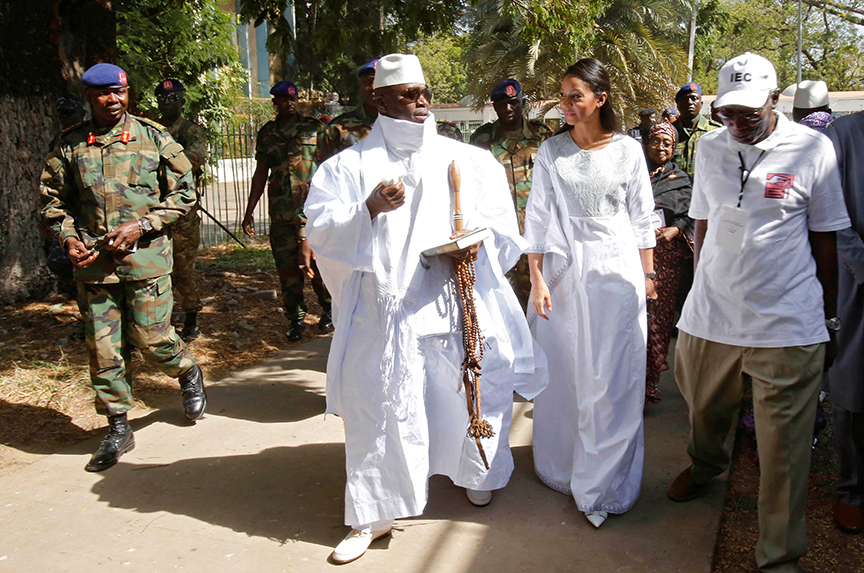 Celebrations in the Gambia after opposition candidate Adama Barrow ousted longtime President Yahya Jammeh in the momentous December presidential elections have been short-lived.
Celebrations in the Gambia after opposition candidate Adama Barrow ousted longtime President Yahya Jammeh in the momentous December presidential elections have been short-lived.
The optimism spurred on by Jammeh’s concession to Barrow a day after election results were announced was soon tempered by his course reversal: on December 9, the eccentric president of twenty-two years appeared on national television to reject the poll results and call for new elections, citing “serious and unacceptable irregularities.” Jammeh seized power in a 1994 coup and has since “won” four elections. Shortly after the announcement, the Gambian military seized the independent electoral commission’s headquarters, and Jammeh initiated a challenge to the election’s result in the country’s Supreme Court—bizarrely, the Gambia’s highest court is headed by a Nigerian whose independence amid a close affiliation with Jammeh has been widely questioned.
The Gambia’s opposition maintains that it will still inaugurate President-elect Barrow on January 19.
Following his concession rescindment, Jammeh unleashed a wave of repression on actual and perceived opponents. In the past week, intelligence operatives and police have shuttered three private radio stations in an attempt to control information. One of the stations resumed broadcasts on January 2, though on the condition that it will only play music. Even before the latest wave of media repression, press freedom in the Gambia was abysmal, and violence against journalists is common. On January 3, Alieu Momar Njai, the head of the Gambia’s independent electoral commission, fled the country after receiving death threats for certifying Barrow’s win.
Many of the country’s diplomats have also urged Jammeh to support a peaceful transfer of power. The Gambia’s ambassador to the United States, Sheikh Omar Faye, was recalled in December after penning a letter that called on security forces in his country to “do the right thing.”
In similar situations, it is the support (or mutiny) of security forces that often tips the balance. Reports that the country’s army chief had pledged the military’s “unflinching loyalty” to Jammeh this week alarmed many. But analysts suggest that the ostensible win for Jammeh isn’t all that it is made out to be—the intentions, timing, and placement in the state-controlled newspaper of this letter are all suspect. As a result, the military’s allegiance remains unknown.
In his attempts to throw the opposition off balance, Jammeh has invoked worrying ethnically-charged rhetoric. In at least one past case, he openly threatened to annihilate the country’s largest ethnic group, of which he is not a member: “I will send the army to wipe you out and see who is going to talk about it.” Should Jammeh continue to exacerbate ethnic tensions, the threat of violence will increase.
But what happens in the Gambia doesn’t stay in the Gambia. Sustained unrest or fallout from a violent crackdown could spill over into neighboring Senegal and the broader region, which is already struggling with high rates of emigration and the threat of Boko Haram and other al Qaeda-linked groups.
The international community, led by regional bloc Economic Community of West African States (ECOWAS) and backed by the African Union, the United Nations, and the United States, conducted a full-court press against Jammeh, attempting to entice or dragoon the erratic president into a lasting concession.
Four heads of state from ECOWAS countries—Nigerian President Muhammadu Buhari, Liberian President Ellen Johnson Sirleaf, Sierra Leonean President Ernest Bai Koroma, and Ghanaian President John Dramani Mahama (who also just lost an election, but has stuck to his promise to step down)—traveled to the Gambia in December in an attempt to persuade Jammeh to step down, to no avail. Buhari, who like Jammeh boasts a military background, is the lead ECOWAS negotiator.
An ECOWAS-led military response is also possible. Senegal, which surrounds the Gambia on three sides (the fourth being the Atlantic Ocean), is the designated lead for military action to remove Jammeh from power, should it be needed. And it wouldn’t be the first time; Senegal invaded the Gambia in 1981, at President Sir Dawda Kairaba Jawara’s request, to put down a rebellion against the elected government. Jammeh has called the decision to place ECOWAS troops on standby an “act of war” and threatened to violently oppose any external force.
As January 19 approaches, negotiators are running out of time to secure a peaceful, and graceful exit for Jammeh.
Kelsey Lilley is associate director of the Atlantic Council’s Africa Center. Follow her on Twitter @KelseyDegen.
Image: Gambian President Yahya Jammeh left a polling station with his wife, Zineb, in Banjul, the Gambia, on December 1, 2016. Jammeh, who was defeated by opposition candidate Adama Barrow, has refused to accept the result. (Reuters/Thierry Gouegnon)
